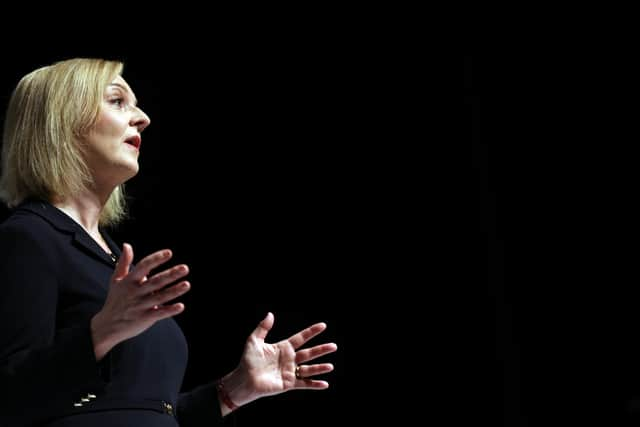Financial market chaos: Polls shows Labour soaring to 33-point lead as voters abandon Tory party in wake of Liz Truss economic plan
And during a visit to an engine plant in Darlington, Mr Kwarteng said the package he announced in the Commons on Friday was “absolutely essential” if the economy was to generate the revenues needed to fund public services.
Julian Smith, a former Cabinet minister, urged the Government to “take responsibility” for the crisis.
Advertisement
Hide AdAdvertisement
Hide Ad“The Government must scrap 45p, take responsibility for the link between last Friday and the impact on people’s mortgages and make clear that it will do everything possible to stabilise markets and protect public services,” he said.


Former science minister George Freeman called on the Cabinet to meet and agree a “Plan B”.
“The economic package of borrowing & tax cuts announced last week clearly can’t command market or voter confidence,” he said on Twitter.
Another MP, Sir Charles Walker, admitted his party would likely lose an election if it was called today based on the polling, but ruled out the possibility of a leadership challenge against Ms Truss.
“We’ve made our bed, we’ve got to lie in it,” he said.
Red Wall Tory MPs reacted with dismay to the Government’s handling of the mini-Budget and said they feared a “deluge” of complaints from constituents as the YouGov poll fanned fears of a Tory wipe-out at the next general election.
And Scottish Conservative leader Douglas Ross admitted he was concerned about his own mortgage as he described the reaction of the markets as a “huge concern”.
Few Conservatives have gone on record to support Ms Truss since her Chancellor’s tax-cutting “plan for growth” sparked chaos in the financial markets and forced the Bank of England to intervene.
One Conservative in a Northern seat said they had “sympathy” with what the UK Government was trying to achieve, but criticised the way the mini-Budget was delivered.
Advertisement
Hide AdAdvertisement
Hide Ad“We want people to have lower taxes, but it has to be delivered in a collaborative way,” said the MP.
“That is the frustration, some of this could have been avoided.”
Another MP said they had found the mini-Budget “thoroughly depressing”, especially because it had not been communicated to the public well enough.
Mr Kwarteng has come under renewed pressure to bring forward his planned statement setting out how he intends to get the public finances back on track after the Office for Budget Responsibility (OBR) said it could produce a preliminary set of forecasts by October 7.
The Chancellor previously said he would deliver his medium-term fiscal plan explaining how he would get debt falling as a percentage of GDP, alongside the updated OBR forecasts, on November 23.
But with the absence of any forecasts to accompany Friday’s “fiscal event” seen as a key factor in spooking the markets, many Tory MPs believe that is too long to wait if they are to restore stability.
Mel Stride, the Conservative chairman of the Commons Treasury Committee, said it should be brought forward to late October – or even earlier – as there was an “urgent need” to increase the confidence of the markets.
Mr Kwarteng brushed off suggestions his mini-budget had been a “major economic disaster”, saying: “Without growth you are not going to get the public services, we are not going to generate the income and the tax revenue to pay for public services.
Advertisement
Hide AdAdvertisement
Hide Ad“That’s why the mini-budget was absolutely essential in re-setting the debate around growth and focusing us on delivering much better outcomes for our people.”
The Prime Minister told BBC Radio Leeds: “We had to take urgent action to get our economy growing, get Britain moving and also deal with inflation.
“Of course that means taking controversial and difficult decisions but I am prepared to do that.”
Their comments came after the Bank launched an emergency government bond-buying programme on Wednesday to prevent borrowing costs from spiralling out of control and stave off a “material risk to UK financial stability”.
It bought up to £65 billion worth of government bonds – known as gilts – at an “urgent pace” after fears over the Government’s tax-cutting plans sent the pound tumbling and sparked a sell-off in the gilts market, which left some UK pension funds teetering on the brink of collapse.
On Thursday, the pound regained some ground, rising to above $1.1 for the first time since last Friday.
However, the FTSE 100 dropped around 2 per cent to 6,864 – its lowest point since March this year, amid a global sell-off, while yields on the UK’s 10-year gilts were up to 4.14 per cent.
Speaking in Northern Ireland, the Bank’s chief economist, Huw Pill, underlined warnings they would have to sharply raise interest rates, noting there was “undoubtedly a UK-specific component” to recent market movements.
Advertisement
Hide AdAdvertisement
Hide AdHis comments contrasted with Ms Truss who, in her interviews, blamed “Vladimir Putin’s war in Ukraine” for pushing up global energy prices.
Labour shadow chancellor Rachel Reeves called on Ms Truss and Mr Kwarteng to reverse their “kamikaze budget”.
“It is disgraceful that the family finances of people across the country are being put on the line simply so the Government can give huge unfunded tax cuts to the richest companies and those earning hundreds of thousands of pounds a year,” she said.
Earlier, trade unions called for a “cast-iron guarantee” there would be no more cuts to public spending after Treasury Chief Secretary Chris Philp confirmed Whitehall departments had been instructed to carry out an “efficiency and prioritisation exercise” in an effort to find savings.